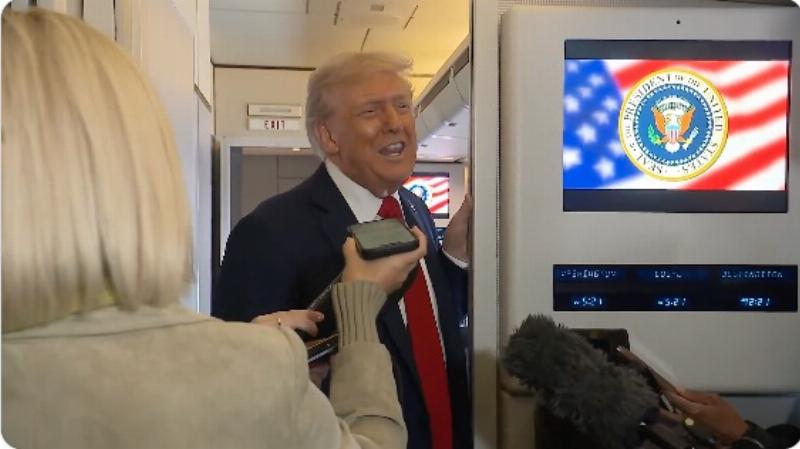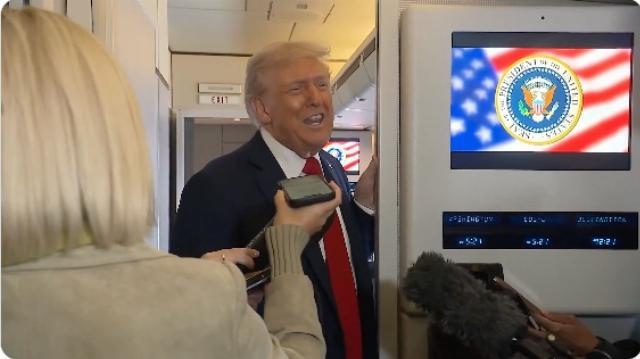


Recently, while flying on Air Force One, Donald Trump confessed that he didn’t believe there was a place for him in Heaven. He added, however, that he’s helped a lot of people over the years—and that’s one of Trump’s rare understatements. The moment I heard Trump’s words, what popped into my mind was a once-popular but now obscure early 19th-century poem by Leigh Hunt entitled “Abou Ben Adhem.” If that poem says anything at all about how the afterlife works, Trump is in luck.
I attended San Francisco public schools in the late 1960s and the 1970s, when the American educational system was giving birth to the disastrous education fads that led to its collapse. That’s why I never really learned math. I had no natural aptitude, and the teaching was terrible.

However, one of my favorite teachers ever, Mrs. Griffith, was a black lady who, while she couldn’t control the math curriculum forced upon her fifth-grade class, could still bring a few of the old-fashioned ways to her students. One of those ways was memorizing and reciting poems. It’s for that reason that I learned, and still remember, “Abou Ben Adhem.”
The poem’s author was Lee Hunt (1784-1859), a British critic and essayist. (British by birth and upbringing, but his parents were actually American loyalists who fled to England during the Revolutionary War.) It was he who introduced the British public to luminaries such as John Keats, Percy Bysshe Shelley, Robert Browning, and Alfred Tennyson. Not only did Hunt recognize good poets when he saw them, but he also wrote poetry himself.
So it was that, in 1834, he wrote “Abou Ben Adhem.” It’s short, so even if you’re not much of a poetry reader, I recommend you take the time to read it, because you’ll see how well it ties in with Trump’s reflections about his eternal salvation:
Abou Ben Adhem (may his tribe increase!)
Awoke one night from a deep dream of peace,
And saw, within the moonlight in his room,
Making it rich, and like a lily in bloom,
An angel writing in a book of gold:—
Exceeding peace had made Ben Adhem bold,
And to the presence in the room he said,
"What writest thou?"—The vision raised its head,
And with a look made of all sweet accord,
Answered, "The names of those who love the Lord."
"And is mine one?" said Abou. "Nay, not so,"
Replied the angel. Abou spoke more low,
But cheerly still; and said, "I pray thee, then,
Write me as one that loves his fellow men."
The angel wrote, and vanished. The next night
It came again with a great wakening light,
And showed the names whom love of God had blest,
And lo! Ben Adhem's name led all the rest.
I’ve always understood the poem to mean that, because we are God’s creations, with each made in his image, true love for one’s fellow man, shown through acts, not just words, is a sign of love for God. But that’s just me.
Honestly, though, is it possible to listen to Trump’s comments on Air Force One without hearing an echo of Abou Ben Adhem?
???? JUST IN: The moment President Trump says he doesn't think he can get into heaven
— Eric Daugherty (@EricLDaugh) October 13, 2025
"I don't think there's anything that's gonna get me in heaven. I really don't. I think I'm not, maybe, heaven-bound."
"I may be in heaven right now as we fly in Air Force One. I'm not sure I'm… pic.twitter.com/WfA7O3rjdH
???? JUST IN: The moment President Trump says he doesn't think he can get into heaven
“I don't think there's anything that's gonna get me in heaven. I really don't. I think I'm not, maybe, heaven-bound.”
“I may be in heaven right now as we fly in Air Force One. I'm not sure I'm gonna be able to make heaven. But I've made life better for a lot of people.” ????
